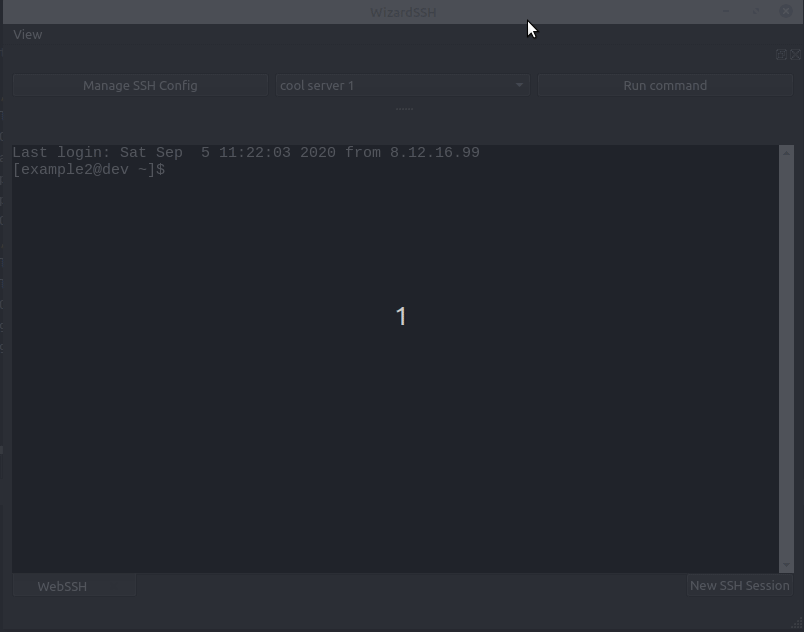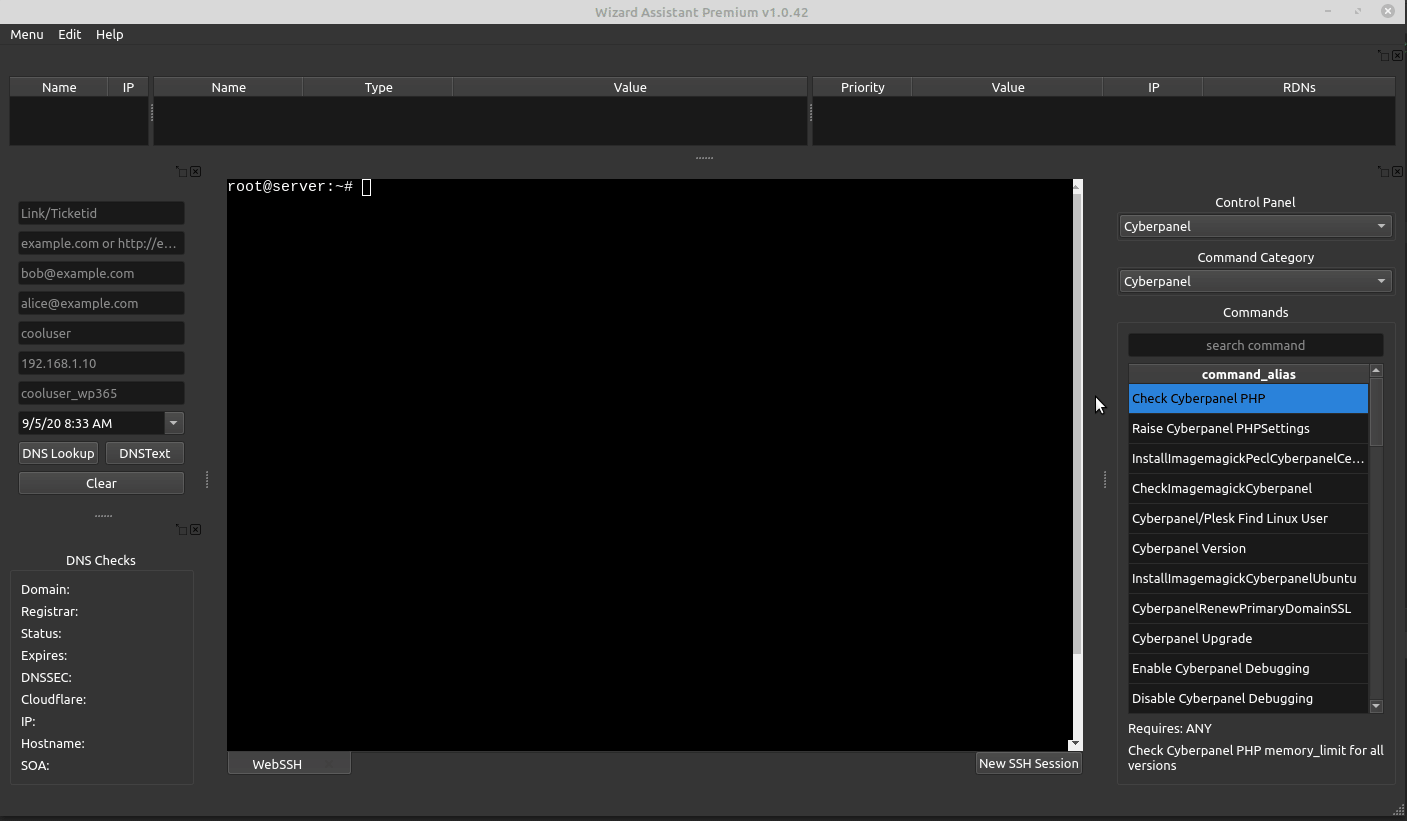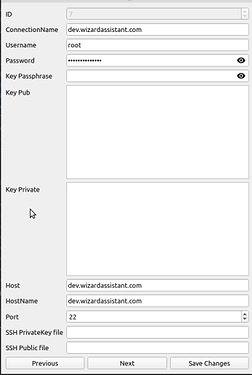mike2750 | 2020-09-19 20:19:25 UTC | #1
Figured I'd share this here as there are very few practicable examples online other then the one i stumbled on the other day which enlightened me to how it works.
I now am able to some super badass stuff with my app and send commands to the ssh session programmatically from Python through the run javscript :slight_smile:

full example code for reference.
#!/usr/bin/env python3
# encoding: utf-8
import os
import sys
from PyQt5 import uic, QtWidgets, QtCore, QtGui, QtWebEngineWidgets
from PyQt5.QtWidgets import QWidget, QVBoxLayout, QPushButton, QApplication, QMessageBox, QDialog, QSplashScreen, \
QDateTimeEdit, QActionGroup, QAbstractItemView, QDockWidget, QPlainTextEdit, QTableWidgetItem
from PyQt5 import QtSql
from PyQt5.QtCore import (QCoreApplication, QRect, QSize, Qt, QUrl, QDateTime, QThread, pyqtSignal as Signal, QEvent,
QFile, QMetaObject, QRegExp, QSortFilterProxyModel, QSettings, QTimer, QTextStream,
QStandardPaths, QObject)
# from PyQt5.QtGui import *
from PyQt5.QtSql import QSqlDatabase, QSqlTableModel, QSqlQueryModel, QSqlQuery
from PyQt5.QtGui import QPixmap, QPalette, QColor, QClipboard, QGuiApplication
from PyQt5.QtCore import pyqtSignal as Signal, pyqtSlot as Slot
from PyQt5.QtCore import QUrl
from PyQt5.QtGui import QIcon
from PyQt5.QtWebEngineWidgets import QWebEngineView, QWebEngineSettings
from PyQt5.QtWidgets import QTabWidget, QApplication, QInputDialog, QFileDialog, QPushButton
free_port = '8889'
settings = QtCore.QSettings('WizardAssistant', 'WizardAssistantDesktop')
if settings.contains("wizardwebsshport"):
# there is the key in QSettings
# print('Checking for wizardwebsshport in config')
wizardwebsshport = settings.value('wizardwebsshport')
# print('Found wizardwebsshport port in config:' + wizardwebsshport)
free_port = wizardwebsshport
else:
print('wizardwebsshport not found in config')
pass
try:
ssh_terminal_url = 'http://localhost:' + str(free_port)
print(ssh_terminal_url)
except:
pass
ssh_username = 'example2'
ssh_password = 'somerandompass'
ssh_key_passphrase = ''
ssh_public_key = ''
ssh_private_key = ''
ssh_host = ''
ssh_hostname = 'dev.example.com'
ssh_port = '22'
ssh_proxy_command = ''
ssh_public_key_file = ''
ssh_private_key_file = ''
totp = ''
cmd = """for phpver in $(ls -1 /opt/cpanel/ |grep ea-php | sed 's/ea-php//g') ; do echo "PHP $phpver" ; /opt/cpanel/ea-php$phpver/root/usr/bin/php -i |grep -Ei 'memory_limit|post_max_size|upload_max_filesize|max_execution_time|session.save_path' && echo "" ; done"""
class TabbedTerminal(QTabWidget):
def __init__(self, parent=None):
super().__init__(parent)
self.setDocumentMode(True)
self.setTabPosition(QTabWidget.South)
self._new_button = QPushButton(self)
self._new_button.setText("New SSH Session")
self._new_button.clicked.connect(self.add_new_tab)
self.setCornerWidget(self._new_button)
self.tabBarDoubleClicked.connect(self.tab_open_doubleclick)
self.currentChanged.connect(self.current_tab_changed)
self.setTabsClosable(True)
self.setMovable(True)
self.tabCloseRequested.connect(self.close_current_tab)
# Uncomment to disable native menubar on Mac
# self.menuBar().setNativeMenuBar(False)
self.add_new_tab(QUrl(ssh_terminal_url), 'Homepage')
# self.show()
self.setWindowTitle("Wizard Assistant SSH")
self.setWindowIcon(QIcon(os.path.join('images', 'ma-icon-64.png')))
def add_new_tab(self, qurl=ssh_terminal_url, label="Blank"):
# if qurl is None:
# qurl = QUrl('http://localhost:8888/')
qurl = QUrl(ssh_terminal_url)
browser = QWebEngineView()
# self.webSettings = browser.settings()
# self.webSettings.setAttribute(QWebEngineSettings.PluginsEnabled, True)
# self.webSettings.setAttribute(QWebEngineSettings.JavascriptEnabled, True)
# self.webSettings.setAttribute(QWebEngineSettings.LocalStorageEnabled, True)
# self.webSettings.setAttribute(QWebEngineSettings.JavascriptCanAccessClipboard, True)
# self.webSettings.setAttribute(QWebEngineSettings.JavascriptCanPaste, True)
# self.webSettings.setAttribute(QWebEngineSettings.LocalContentCanAccessFileUrls, True)
# self.webSettings.setAttribute(QWebEngineSettings.JavascriptCanOpenWindows, True)
# self.webSettings.setAttribute(QWebEngineSettings.LocalContentCanAccessRemoteUrls, True)
# self.webSettings.setAttribute(QWebEngineSettings.AllowWindowActivationFromJavaScript, True)
browser.setUrl(qurl)
i = self.addTab(browser, label)
self.setCurrentIndex(i)
# More difficult! We only want to update the url when it's from the
# correct tab
# browser.urlChanged.connect(lambda qurl, browser=browser:
# self.update_urlbar(qurl, browser))
browser.loadFinished.connect(lambda _, i=i, browser=browser:
self.setTabText(i, browser.page().title()))
browser.titleChanged.connect(lambda _, i=i, browser=browser:
self.setTabText(i, browser.page().title()))
browser.titleChanged.connect(lambda _, i=i, browser=browser:
self.setTabToolTip(i, browser.page().title()))
def tab_open_doubleclick(self, i):
if i == -1: # No tab under the click
self.add_new_tab()
def current_tab_changed(self, i):
qurl = self.currentWidget().url()
self.update_title(self.currentWidget())
def close_current_tab(self, i):
if self.count() < 2:
return
self.removeTab(i)
def update_title(self, browser):
if browser != self.currentWidget():
# If this signal is not from the current tab, ignore
return
title = self.currentWidget().page().title()
self.setWindowTitle("%s - Wizard Assistant SSH" % title)
def navigate_webssh(self):
self.currentWidget().setUrl(QUrl(ssh_terminal_url))
def navigate_home(self):
self.currentWidget().setUrl(QUrl(ssh_terminal_url))
def navigate_to_url(self): # Does not receive the Url
q = QUrl(self.urlbar.text())
if q.scheme() == "":
q.setScheme("http")
self.currentWidget().setUrl(q)
def open_file(self):
filename, _ = QFileDialog.getOpenFileName(self, "Open file", "",
"SSH Private Key (id_*);;"
"All files (*.*)")
if filename:
with open(filename, 'rb') as f:
sshkeyprivate = f.read()
f.close()
@QtCore.pyqtSlot(bool)
def on_load_finished(self, ok):
if ok:
script = """
// pass an object to wssh.connect
var opts = {
hostname: '%s',
port: '%s',
username: '%s',
password: '%s',
privatekey: '%s',
passphrase: '%s',
totp: '%s'
};
wssh.connect(opts);
""" % (ssh_hostname, ssh_port, ssh_username, ssh_password, ssh_private_key, ssh_key_passphrase, totp)
self.currentWidget().page().runJavaScript(script)
@QtCore.pyqtSlot(bool)
def run_command_via_js(self):
script = """
// var cmd = (function() {/**/}).toString().match(/[^]*\/\*([^]*)\*\/\}$/)[1];
wssh.send(`%s`);
""" % cmd
self.currentWidget().page().runJavaScript(script)
qtCreatorFile = os.path.join(os.path.abspath(os.path.dirname(sys.argv[0])), "ui",
"sshterminal.ui") # Type your file path
Ui_MainWindow, QtBaseClass = uic.loadUiType(qtCreatorFile)
class build(Ui_MainWindow, QtWidgets.QMainWindow):
def __init__(self, parent=None):
QtWidgets.QMainWindow.__init__(self)
Ui_MainWindow.__init__(self)
self.setupUi(self)
for name, obj in dict(self.__dict__).items():
# print(str(name) + str(obj))
obj_type = str(obj).strip("<PyQt5").rsplit(" ")[0].replace(".", '', 1)
# obj_type = str(obj).strip("<").rsplit(" ")[0]
# print(obj_type)
# obj_type = obj_str.strip("<PyQt5").rsplit(" ")[0].replace(".", '', 1)
label_name = "self." + str(name)
try:
label_name = self.findChild(eval(obj_type), name)
print(str(label_name) + ' created')
except:
pass
if not isinstance(obj_type, QObject):
continue
try:
print('Trying to embed SSH Terminal Widget')
self.sshterminal = TabbedTerminal(self.ssh_placeholder_widget)
self.sshterminal.setObjectName(u"sshterminal")
self.verticalLayout_2.addWidget(self.sshterminal)
self.sshterminal.setStyleSheet("QTabBar::tab { height: 25px; width: 125px; }")
print('Embedded SSH Terminal Widget completed')
except:
print('Unable to embed SSH Terminal Widget')
pass
self.new_session_pushButton.setText('Run command')
self.new_session_pushButton.clicked.connect(self.sshterminal.run_command_via_js)
def start():
app = QtWidgets.QApplication(sys.argv)
QApplication.setStyle("Fusion")
#
# # Now use a palette to switch to dark colors:
palette = QPalette()
palette.setColor(QPalette.Window, QColor(53, 53, 53))
palette.setColor(QPalette.WindowText, Qt.white)
palette.setColor(QPalette.Base, QColor(25, 25, 25))
palette.setColor(QPalette.AlternateBase, QColor(53, 53, 53))
palette.setColor(QPalette.ToolTipBase, QColor(25, 25, 25))
palette.setColor(QPalette.ToolTipText, Qt.white)
palette.setColor(QPalette.Text, Qt.white)
palette.setColor(QPalette.Button, QColor(53, 53, 53))
palette.setColor(QPalette.ButtonText, Qt.white)
palette.setColor(QPalette.BrightText, Qt.red)
palette.setColor(QPalette.Link, QColor(42, 130, 218))
palette.setColor(QPalette.Highlight, QColor(42, 130, 218))
palette.setColor(QPalette.HighlightedText, Qt.black)
QApplication.setPalette(palette)
bld = build()
bld.show()
sys.exit(app.exec_())
if __name__ == '__main__':
start()
Now with this I can do some really slick stuff now not possible in any other way in most terminals :slight_smile:

Never miss an update
Enjoyed this? Subscribe to get new updates straight in your Inbox.
Hopefully this will help someone else out if theyre looking for how to do this with QtWebengine
Resources: https://stackoverflow.com/questions/55947552/pyqt5-retrieve-form-values-using-runjavascript https://doc.qt.io/qtforpython/PySide2/QtWebEngineWidgets/QWebEnginePage.html#id5 http://www.366service.com/jp/qa/be447fc5bf361b1c7ab234de61497a0d http://python.6.x6.nabble.com/inject-code-to-webpage-using-QWebEnginePage-runJavaScript-td5255473.html
martin | 2020-09-19 20:19:04 UTC | #2
This is really nice @mike2750 thanks for sharing! I can see what you were getting at now -- being able to trigger more complex commands from a simple menu (effectively macros I guess?) ...will it be possible for users to add custom ones too?
How does this bit work (...i.e. where is the cmd var set)?
@QtCore.pyqtSlot(bool)
def run_command_via_js(self):
script = """
// var cmd = (function() {/**/}).toString().match(/[^]*\/\*([^]*)\*\/\}$/)[1];
wssh.send(`%s`);
""" % cmd
self.currentWidget().page().runJavaScript(script)
mike2750 | 2020-09-20 03:17:07 UTC | #3
Thanks. Yeah it does kinda work like a macro in a way. Its like pasting it in but being executed via the runjavascript and the wssh.send in wizardwebssh.
I do play to add command editing but I'm working on finishing up the SSH config editor which i did im using the data widget mapper for.

I plan to use the same approach with the command editor but the main hurdle is i want user added commands to be merged seamlessly with the auto updating main commands db. It looks like i will have to use QT SQL Query approach to search across multiple sqlite databases or use a QConcatenateTablesProxyModel so that results from the built in or company level commands db which self updates doesn't overwrite the user level commands db which will be in
For windows:
%LocalAppData%\WizardAssistant\WizardAssistantDesktop
Which with pyqt settings i load like this
settings = QtCore.QSettings('WizardAssistant', 'WizardAssistantDesktop')
config_data_dir = Path("WizardAssistant/WizardAssistantDesktop")
if settings.contains("sshconfig_db"):
# there is the key in QSettings
print('Checking for ssh_db location preference in config')
sshconfig_db = settings.value('sshconfig_db')
print('Found sshconfig_db in config:' + sshconfig_db)
else:
print('sshconfig_db not found in config. Using default')
sshconfig_db = QStandardPaths.writableLocation(
QStandardPaths.AppConfigLocation) / config_data_dir / "wizardwebssh.db"
settings.setValue('sshconfig_db', str(sshconfig_db))
pass
In regards to the command its dynamically generated depending on form input if there is variable information then substitutions occur on the placeholder variable names. I'll be submitting my app for review and code advise eventually here once it feel its almost done with the major stuff.
def listclicked(self, index):
print('============BEGIN listclicked==================')
global cmd_replaced
row = index.row()
cmd = self.proxy_model.data(self.proxy_model.index(row, 3))
cmd_requires = self.proxy_model.data(self.proxy_model.index(row, 4))
cmd_description = self.proxy_model.data(self.proxy_model.index(row, 5))
print(cmd_description)
self.command_description.setText(cmd_description)
self.command_requires_label.setText('Requires: ' + cmd_requires.upper())
global ticketid, domain, url, email, email2, username, clientip, date_time_input, apache_dom_date, apache_error_date, litespeed_error_date, dcpumon_date, linuxlog_date, atop_date, time_24hr_format, time_12hr_format, apache_dom_datetime, apache_error_datetime, litespeed_error_datetime, linuxlog_datetime, panel_main_error_log, panel_login_log, session_log, access_log, http_error_log, http_error_logs_dir, modsec_log, domlog_path, ssh_log, ftp_log, cron_log, firewall_log, bruteforce_log, email_mainlog, email_authlog, kernel_general_log, mysql_log, suspension_log, malware_scanner, malware_scanner_q, support_email, company_script_domain, fix_perms
self.form_variable_setup()
self.controlpanel_logs_substitutions()
def get_random_alphanumeric_string(length):
letters_and_digits = string.ascii_letters + string.digits
result_str = ''.join((random.choice(letters_and_digits) for i in range(length)))
print("Random alphanumeric String is:", result_str)
return result_str
random_pass = get_random_alphanumeric_string(8)
substitutions = {
"TicketIDInputField": ticketid,
"DomainInputField": domain,
"Email1InputField": email,
"Email2InputField": email2,
"CPUsernameInputField": username,
"DatabaseNameInputField": databasename,
"ClientIPInputField": clientip,
"ApacheErrorDateInputField": apache_error_date,
"LitespeedErrorDateInputField": litespeed_error_date,
"DcpumonDateInputField": dcpumon_date,
"LinuxDateInputField": linuxlog_date,
"LinuxDayNumberInputField": linuxlog_day_number,
"AtopDateInputField": atop_date,
"TimeInputField_time_24hr_format": time_24hr_format,
"TimeInputField_time_12hr_format": time_12hr_format,
"ApacheDomDateInputField": apache_dom_date,
"ApacheDomDateTimeInputField": apache_dom_datetime,
"ApacheErrorDateTimeInputField": apache_error_datetime,
"LitespeedErrorDateTimeInputField": litespeed_error_datetime,
"LinuxDateTimeInputField": linuxlog_datetime,
"PanelMainErrorLog": panel_main_error_log,
"PanelLoginLog": panel_login_log,
"PanelSessionLog": session_log,
"PanelAccessLog": access_log,
"HTTPErrorLog": http_error_log,
"HTTPErrorLogsDir": http_error_logs_dir,
"ModsecLog": modsec_log,
"DomLogPath": domlog_path,
"SSHLog": ssh_log,
"FTPLog": ftp_log,
"CronLog": cron_log,
"FirewallLog": firewall_log,
"BruteforceLog": bruteforce_log,
"EmailMainLog": email_mainlog,
"EmailAuthLog": email_authlog,
"KernelGeneralLog": kernel_general_log,
"MySQLLog": mysql_log,
"SuspensionLog": suspension_log,
"MalwareScanner": malware_scanner,
"MalwareScannerQuarantine": malware_scanner_q,
"SupportEmail": support_email,
"CompanyScriptDomain": company_script_domain,
"RandomPass": random_pass,
"FixPerms": fix_perms, }
cmd_replaced = replace(cmd, substitutions)
# print(row)
# print(cmd)
print()
# print("id = %s" % projectModel.record(row).field(0).value().toString())
print("command = %s" % self.proxy_model.data(self.proxy_model.index(row, 3)))
print("adjusted command = %s" % cmd_replaced)
command_alias_selected = self.proxy_model.data(self.proxy_model.index(row, 2))
# dialog_notification('Command Copied to Clipboard' + str(command_alias_selected))
# setup clipboard and copy command to clipboard when selected
clipboard = QGuiApplication.clipboard()
original_text = clipboard.text()
clipboard.setText(cmd_replaced)
if is_linux():
clipboard.setText(cmd_replaced, QClipboard.Selection)
self.sshterminal.setFocusPolicy(Qt.StrongFocus)
# self.sshterminal.setText(clipboard.text())
print('============END listclicked==================')
Also been trying to figure out how to define the tooltip for tableview from existing qsqltable model seen nothing conclusive how to do that but it might be easier to do if i switch to QT SQL Query or proxy model i suppose.
